Potrebujeme váš súhlas na využitie jednotlivých dát, aby sa vám okrem iného mohli ukazovať informácie týkajúce sa vašich záujmov. Súhlas udelíte kliknutím na tlačidlo „OK“.
ASTM D4107-08(2013)
Standard Test Method for Tritium in Drinking Water
Automaticky preložený názov:
Štandardná skúšobná metóda pre trícium v pitnej vode
NORMA vydaná dňa 15.6.2013
Informácie o norme:
Označenie normy: ASTM D4107-08(2013)
Poznámka: NEPLATNÁ
Dátum vydania normy: 15.6.2013
Kód tovaru: NS-26066
Počet strán: 6
Približná hmotnosť: 18 g (0.04 libier)
Krajina: Americká technická norma
Kategória: Technické normy ASTM
Kategórie - podobné normy:
Anotácia textu normy ASTM D4107-08(2013) :
Keywords:
drinking water, 3H, liquid scintillation, radioactivity, radioisotope, tritium, ICS Number Code 13.060.50 (Examination of water for chemical substances)
Doplňujúce informácie
| Significance and Use | ||||||||||
|
5.1 This test method was developed for measuring tritium in water to determine if the concentration exceeds the regulatory statutes of drinking water. This test method also is applicable for the determination of tritium concentration in water as required by technical specifications governing the operations of nuclear power facilities. With suitable counting technique, sample size, and counting time a detection limit of less than 37 Bq/L (1000 pCi/L) is attainable by liquid scintillation. |
||||||||||
| 1. Scope | ||||||||||
|
1.1 This test method covers the determination of tritium in drinking water by liquid scintillation counting of the tritium beta particle activity. 1.2 This test method is used successfully with drinking water. It is the user's responsibility to ensure the validity of this test method for untested water matrices. 1.3 The tritium concentrations, which can be measured by this test method utilizing currently available liquid scintillation instruments, range from less than 0.037 Bq/mL (1 pCi/mL) to 555 Bq/mL (15 000 pCi/mL) for a 10-mL sample aliquot. Higher tritium concentrations can be measured by diluting or using smaller sample aliquots, or both. 1.4 The maximum contaminant level for tritium in drinking water as given by the United States Environmental Protection Agency (U.S. EPA) National Interim Primary Drinking Water Regulations (NIPDWR) is 0.740 Bq/mL (20 pCi/mL). The NIPDWR lists a required detection limit for tritium in drinking water of 0.037 Bq/mL (1 pCi/mL), meaning that drinking water supplies, where required, should be monitored for tritium at a sensitivity of 0.037 Bq/mL (1 pCi/mL). In Appendix X1, Eq X1.3 is given for determining the necessary counting time to meet the required sensitivity for drinking water monitoring. 1.5 The values stated in SI units are to be regarded as standard. No other units of measurement are included in this standard. 1.6 This standard does not purport to address all of the safety concerns, if any, associated with its use. It is the responsibility of the user of this standard to establish appropriate safety and health practices and determine the applicability of regulatory limitations prior to use. |
||||||||||
| 2. Referenced Documents | ||||||||||
|
Podobné normy:
Historická
1.1.2013
Historická
1.5.2011
Historická
1.10.2008
Historická
15.5.2009
Historická
1.6.2012
Historická
1.9.2012
Odporúčame:
Aktualizácia technických noriem
Chcete mať istotu, že používate len platné technické normy?
Ponúkame Vám riešenie, ktoré Vám zaistí mesačný prehľad o aktuálnosti noriem, ktoré používate.
Chcete vedieť viac informácií ? Pozrite sa na túto stránku.


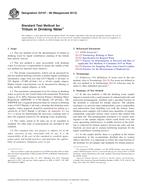
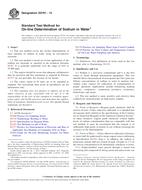 ASTM D2791-13
ASTM D2791-13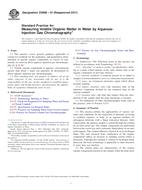 ASTM D2908-91(2011)..
ASTM D2908-91(2011)..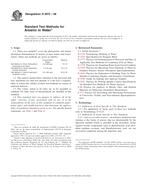 ASTM D2972-08
ASTM D2972-08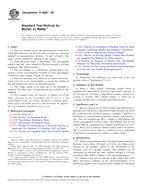 ASTM D3082-09
ASTM D3082-09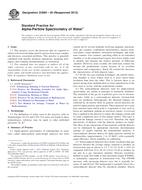 ASTM D3084-05(2012)..
ASTM D3084-05(2012)..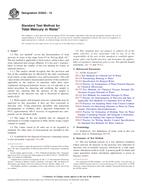 ASTM D3223-12
ASTM D3223-12
 Cookies
Cookies
